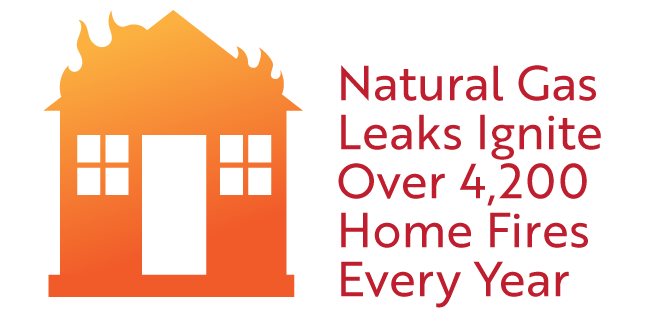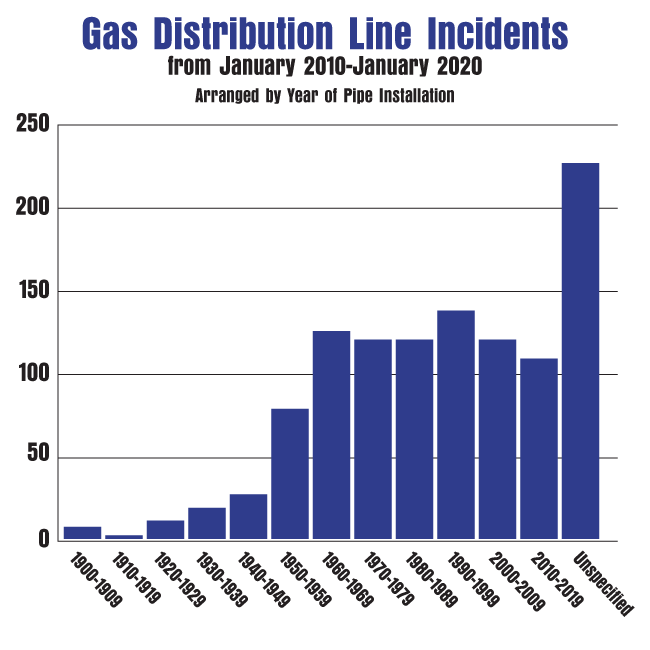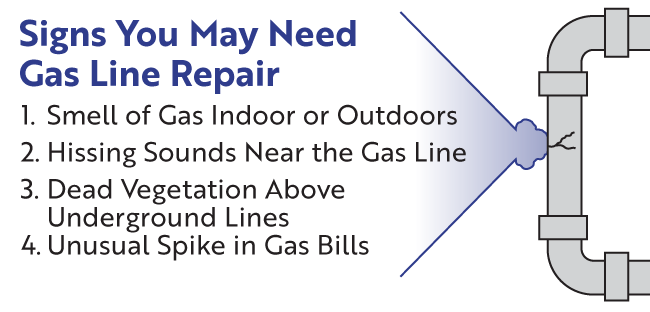Gas lines power some of your home’s most essential appliances, including furnaces, water heaters, stoves, and fireplaces. However, when they leak or corrode, they don’t stop working; they become a serious safety threat.
In fact, according to the U.S. Pipeline and Hazardous Materials Safety Administration (PHMSA), gas pipeline incidents caused over 306 casualties in the last 20 years. Moreover, these incidents resulted in over $6 billion in property damage.
Understanding when and why gas line repair is needed can protect your family and save you thousands in potential emergencies.
To stay informed, here’s what you should know.
4 Common Gas Line Issues Homeowners Face
Whether you live in an older home or recently had gas appliances installed, knowing the common gas line issues helps you take action before something dangerous happens.
Let’s look at the most frequent gas line problems homeowners encounter:
1. Gas Leaks
Gas leaks are the most serious and urgent issue homeowners can face. They often go undetected until symptoms appear, such as the smell of rotten eggs, hissing sounds, or the sudden onset of health problems.
According to the National Fire Protection Association (NFPA), natural gas leaks ignite over 4,200 home fires every year.
If you suspect a leak, leave the house immediately, avoid using electrical switches, and contact emergency services.
2. Corrosion and Aging Pipes
Over time, gas pipes corrode, particularly those made from older materials such as black steel or bare copper. Exposure to moisture in the soil or air causes rust and internal decay, weakening the pipe walls.
As pipes age, they can develop small cracks, leaks, or reduced pressure. Corroded pipes also fail to meet modern safety standards, which could lead to mandatory replacement during home sales or insurance assessments.
3. Pressure Irregularities
Gas appliances require steady, correct pressure to operate efficiently. If your gas line is damaged, blocked, or poorly regulated, it can lead to inconsistent pressure. This causes problems such as weak burner flames, water heaters not maintaining their temperature, and more.
In some cases, external construction activity nearby can damage underground gas lines, leading to pressure drops. If you notice fluctuating appliance performance or unexpected changes in your gas usage, have a technician check for leaks or pipe damage.
4. Poor Installation or DIY Fixes
Improper gas line installation is a major safety hazard. Unfortunately, some homeowners or handymen try installing or repairing gas lines without the proper certifications. This often leads to loose fittings, poor sealing, or the wrong pipe materials being used.
DIY fixes not only void warranties but also violate local building codes and increase the risk of fire or explosion.
Signs You Might Need Gas Line Repair
If you notice any of the signs below, it’s time to call a licensed professional immediately:
Smell of Gas Indoor or Outdoors
Natural gas itself is odorless, but gas companies add a chemical called Mercaptan to make it smell like rotten eggs or sulfur. If you ever catch this strong smell inside your home or near outdoor gas lines, you should immediately call emergency services.
Hissing Sounds Near the Gas Line
A high-pitched hissing or whistling sound near your gas meter, appliances, or exposed pipes indicates gas is escaping through a crack or loose fitting. While water leaks often drip or gurgle, gas leaks create a sharp hissing sound due to the pressure in the lines.
Dead Vegetation Above Underground Lines
Underground gas lines can leak over time due to corrosion, damage from tree roots, or ground shifting. When this happens, the leaking gas often suffocates plant life above the line.
If you notice a patch of dead or discolored grass, plants, or bushes in your yard, especially if the rest of the lawn is healthy, it could be due to a hidden gas leak below.
Unusual Spike in Gas Bills
A sudden increase in your monthly gas bill, without a corresponding change in usage habits, is a potential sign of a hidden leak. Even small leaks cause your appliances to work harder or longer than necessary.
For instance, your water heater might need more time to heat water, or your furnace may struggle to maintain temperature.
How Gas Line Repair Services Work
Here’s a step-by-step breakdown of what to expect from professional gas line repair services.
1. Inspection and Leak Detection
The process starts with a full inspection of the gas line system. Technicians use a combination of visual inspection, electronic gas detectors, and, in some cases, pressure testing to locate the source of the issue.
If the leak is underground, tracer gas methods or ground microphones may be used. During this phase, the technician will also assess the overall condition of the piping. This inspection usually takes 30 to 60 minutes, depending on the size and complexity of your gas system.
2. Shut-Off and Safety Measures
Safety is the top priority before any physical repair work begins. The gas supply is shut off at the main valve, and the technician will ensure the area is well-ventilated. If the leak is indoors or severe, you may be asked to evacuate until it’s deemed safe.
Nearby appliances connected to the gas line are also turned off to prevent ignition. Clear boundaries may be set around the work area for outdoor or underground leaks.
3. Repair vs Replacement Options
After diagnosing the issue, the technician will decide whether the pipe should be repaired or replaced. Minor problems, such as a loose joint or small pinhole leak, can often be fixed with sealants, fittings, or pipe clamps.
More serious problems may require full or partial pipe replacement. Modern replacements use flexible, corrosion-resistant materials like polyethylene (PE) or corrugated stainless steel tubing (CSST) for pipes.
4. Final Testing and System Repressurization
Once the repair and replacement are complete, the technician will perform final safety testing before turning the gas back on. This includes a pressure test using air or nitrogen to check leaks and verify that the system can hold pressure over a set duration.
Once it passes inspection, the system is slowly repressurized with gas. Appliances are then tested one by one to confirm proper operation and gas flow.
How Much Do Gas Line Repairs Cost?
Gas line repair costs in 2025 vary significantly based on the complexity of the issue. Minor repairs like fixing loose connections or small accessible leaks typically range from $200 to $1,200.
Major repairs involving underground lines or extensive pipe replacement cost between $300 and $3,000. Complete gas line replacements can range from $3,000 to $7,000 or more.
While these repairs can be expensive, they’re essential investments in safety. Natural gas incidents have cost U.S. residents nearly $5.5 billion in damages over the past two decades, making professional repair a critical protection for your family and property.
FAQs
Need Reliable Gas Line Repair in Corydon, IN?
Gas line problems are never something to ignore. The best thing any homeowner can do is stay informed and trust licensed plumbing professionals for inspection and gas line repair in Corydon, IN.
Gas issues don’t fix themselves, so get a professional before it turns into something serious.
If you’re unsure who to call for help or need a gas line repair service, you can count on H2O Plumbing to help.





